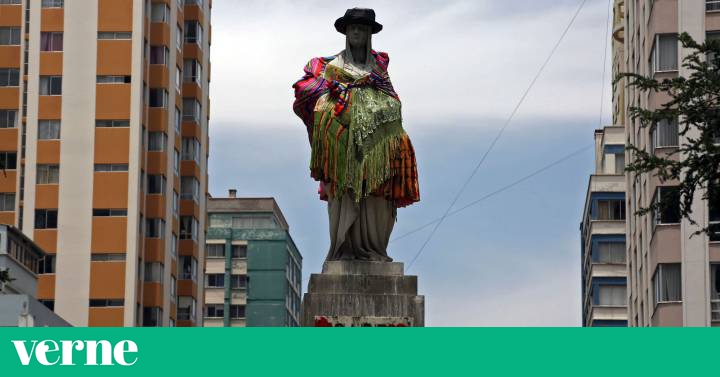A group of Bolivian activists placed a pollera (traditional skirt worn by indigenous women in Bolivia) on the statue dedicated to Isabel La Católica, which is located in one of the most exclusive areas of La Paz (Bolivia).
The action, which took place on the anniversary of the arrival of Christopher Columbus in America, was not an isolated event.
The day was marked in various parts of the continent by acts of protest against colonialism and the conquest of America that had the statues of Christopher Columbus as the objective of the protests.
Bolivian activists adorned the statue of the Queen of Castile, who financed Columbus's expedition in 1492, with a typical Bolivian hat and a colorful aguayo, the traditional woolen blanket with which Andean women or "cholas" carry their babies. in the back.
"Spanish colonialism brings the figure of the white woman and establishes, throughout the continent, a model of woman, beauty and virtue, a very specific subject of femininity that works to this day in Latin American societies. Women Non-white is, par excellence, the ugly one, the unwanted one, the one destined for the cheapest and hardest jobs ", points out to
Verne
, María Galindo, founder and member of Mujeres Creando, the group behind the intervention.
Plaza Isabel La Católica was renamed "Plaza de la Chola globalizada".
Images provided by Mujeres Creando
From the organization they propose to re-signify and reinterpret history based on clothing, the body and history.
All this goes through claiming the place of indigenous women in society.
"The chola, at this moment, has entered important economic sectors of our reality: many are dedicated to importing from China, selling contraband, they are entering the university, etc. The idea that indigenous women are imprisoned in the original culture far from the world it is a fallacious idea. So we said: chola yes, but supercosmopolitan, "says the anarcho-feminist activist.
The action that took place in the center of La Paz, in the area of San Jorge, aroused conflicting reactions in Bolivian society and also numerous criticisms.
"Yesterday was Bolivian Women's Day and, although we are indifferent to celebrations of this style, we were interested in taking advantage of these two dates to intervene on the idea of the white woman. The white woman as the queen, patron saint, owner of the world We turned her into a chola from a playful movement, and they told us that we had wronged the monument. Why? Why is undressing the queen and putting on a suit that characterizes indigenous women an offense? There operates a racist mentality that understands that as an insult, "affirms María Galindo.
The activist says that the intervention was guided by three of her indigenous colleagues from the Mujeres Creando collective.
"The three started as domestic workers and now one is studying Sociology, another Law, and the third is the first Chola to graduate as a chef from the hotel school in La Paz," she says.
Galindo remembers the case of the last one, Emiliana Quispe, whom she tells that she was asked to stop wearing the skirt in her classes because the institution considered it "unhygienic."
"How is it going to be unsanitary?"
And sentence: "The chola has entered La Paz society and not thanks to their employer or the State, but despite these and all the racism deployed against them."
AFP
Follow Verne México on Facebook, Twitter and Instagram and don't miss your daily ration of Internet wonders.

